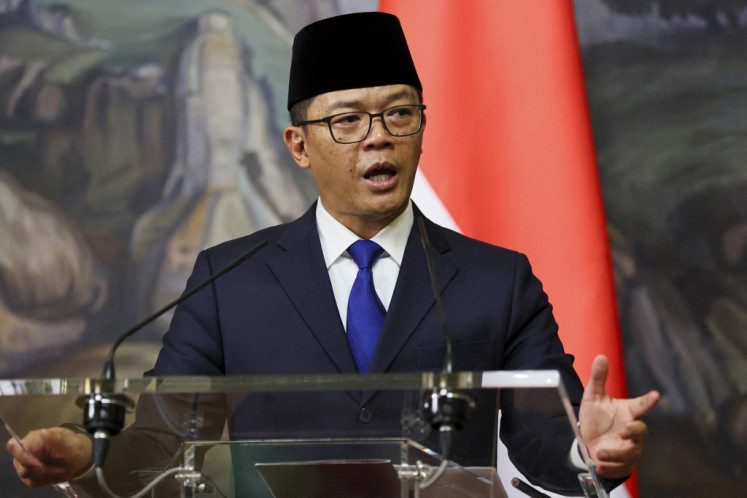Popular Reads
Top Results
Can't find what you're looking for?
View all search resultsPopular Reads
Top Results
Can't find what you're looking for?
View all search resultsASEAN nations to speak out against illegal waste exports
ASEAN leaders are expected to raise the issue of hazardous waste exports during an upcoming summit in Bangkok on the weekend, Indonesia’s lead ASEAN official said, just as member states are sending containers full of waste back to the developed countries where they originated
Change text size
Gift Premium Articles
to Anyone

A
SEAN leaders are expected to raise the issue of hazardous waste exports during an upcoming summit in Bangkok on the weekend, Indonesia’s lead ASEAN official said, just as member states are sending containers full of waste back to the developed countries where they originated.
Having issued an ASEAN foreign ministers’ statement on the illegal transboundary movement of hazardous waste in August, Southeast Asian leaders are set demand accountability from partners like Australia and the United States at the East Asia Summit (EAS) on Monday.
The Foreign Ministry’s director general of ASEAN affairs, Jose Tavares, said even though the implementation of illegal waste regulations would eventually be carried out at the national level, the concerns of the countries involved would still be expressed during international forums.
“This can be directly conveyed at the very highest level by the heads of state or foreign ministers so that they [the exporting countries] would pay more attention to the implementation of regulations,” he said.
The EAS is an annual meeting of the leaders of ASEAN and its eight regional partners: Australia, China, Japan, India, New Zealand, South Korea, Russia and the US.
In the statement issued about the ASEAN ministerial meeting in August, ASEAN foreign ministers said they rejected the illegal transboundary movement of waste to Southeast Asia and called for all states to “take necessary measures to ensure the environmentally sound management of hazardous waste and chemical waste in their respective jurisdictions”.
For the past few months, Indonesia has pushed for a standalone ASEAN position on the matter, ministry spokesperson Teuku Faizasyah said recently, amidst a sharp increase of shipments of plastic waste from developed countries to developing nations that began earlier this year, following China’s decision to ban imports of 24 types of waste materials.
“A few months ago, the foreign minister also summoned the ambassadors of the countries [that exported] the waste and demanded they take responsibility for the containers that entered Indonesia,” he said. “There is already a follow-up: Containers that have been found to have veered from [the destinations stipulated in] their respective manifest documents have been sent back.”
According to Indonesian Customs and Excise Office data from September, authorities have sent back at least 331 containers filled with contaminated non-hazardous waste to numerous countries, including the US.
Non-hazardous waste, mostly comprising clean scrap paper, was intended to be used by paper recycling companies in Indonesia. However, most of the cargo was found to be contaminated by hazardous waste such as old diapers and plastics, which industries reject and which end up in landfills.
A provision on returning imported hazardous waste to countries of origin is included in the 1989 Basel Convention, an international treaty that controls the movement of hazardous waste among countries. Indonesia is among those that have ratified the convention.
Malaysia is also working to send more than 300 containers carrying plastic waste back to their places of origin – Japan, Hong Kong, Europe, Canada and the US – with some of them close to agreeing to a deal to take back a total of 200 containers, Reuters reports.
Faizasyah said that while both sending countries and receiving countries were responsible for the illegal waste shipments, Indonesia had done its utmost as a party to the Basel Convention in upholding import regulations and arresting those who violated them.
“On the other hand, the countries of origin are also responsible for all of the containers leaving their ports. They are responsible for checking the contents and ensuring there are no dangerous materials. That is what we have been telling these countries and we noted their commitments, since some of the countries are not party to the convention,” he said.
As of October 2018, there are only nine United Nations member states that were not party to the treaty: Timor Leste, Fiji, Grenada, Haiti, San Marino, Solomon Islands, South Sudan, Tuvalu and the US.
Of the 58 containers meant to be sent back to the US, as many as 38 were diverted to India, a global waste trade watchdog, the Basel Action Network, found. Meanwhile, three containers were sent to South Korea and one container each to Thailand, Vietnam, Mexico, the Netherlands and Canada. Only 12 containers were returned to the US.









